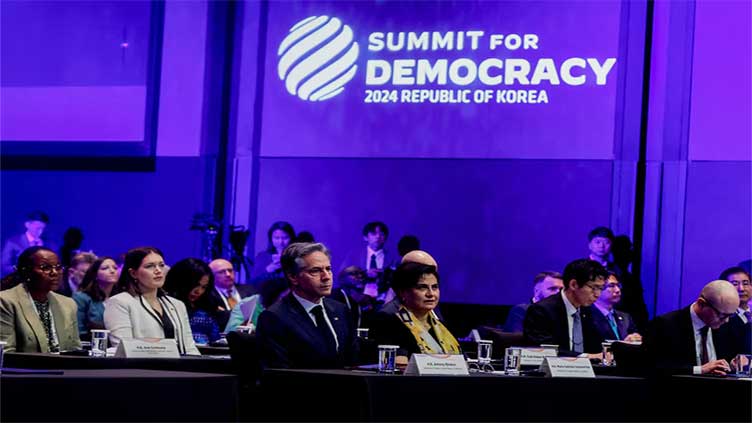Blinken says authoritarian regimes using tech to undermine democracy

World
Like-minded governments and people were working together to promote free, fair elections, he said
SEOUL (Reuters) – US Secretary of State Antony Blinken said on Monday technology should be employed to sustain democratic values in the face of efforts by authoritarian and repressive regimes to deploy technology to undermine democracy and human rights.
Like-minded governments and their people were working together to promote free and fair elections, Blinken said, noting safeguarding democracy was a collective effort.
"As authoritarian and repressive regimes deploy technologies to undermine democracy and human rights, we need to ensure that technology sustains and supports democratic values and norms," he said at the opening of the Summit for Democracy in South Korea.
Blinken said: “But AI is also a critical arena in which democracy is being challenged.
“So while we seek to harness the power of AI and other digital technologies for good, some governments are abusing those same technologies to do just the opposite.
“They’re using AI tools, like facial recognition and bots, to surveil their own citizens. Harass journalists, human rights defenders, and political dissidents. Spread mis- and disinformation that undermines free and fair elections, or sets one segment of our societies against another.
“Our democracies are hardly immune to the harms from AI misuse and failure, including impacts from the choices that tech companies make in deploying their innovations – from our citizens being able to access fewer and less diverse media sources because of the failures of AI-enabled search engines, to discrimination and bias that disproportionately affect racial and ethnic minorities.
“The United States is determined to shape the terms of our technological future in a way that’s inclusive, rights-respecting, that sustains democratic values and democratic institutions. We’ve made historic investments in our technological capabilities and those of our democratic partners.
“At the same time, we’re pairing those investments with efforts to lead on the governance of artificial intelligence. Those include an executive order strengthening AI safety and security, privacy protections, and equity and civil rights, while promoting innovation. We’ve also set out an AI Risk Management Framework, a Blueprint for an AI Bill of Rights, a new AI Safety Institute, voluntary commitments endorsed by 15 top tech companies, and an international code of conduct for organizations developing advanced AI systems.
“We’re building broad and inclusive support to uphold safe, secure, and trustworthy AI. Just this week, the United Nations is set to adopt the first-ever standalone resolution on AI – focused on ensuring that AI is deployed to advance sustainable development and actually deliver progress in people’s lives. This resolution is led by the United States; it’s now co-sponsored by more than 75 countries. And to those who have not yet joined, we really invite you to do so.
“This unity reflects a strong global consensus in support of two equally important goals: that AI is safe, secure, and trustworthy, and that its benefits are actually shared by all. We must support governance and capacity building that narrows the digital divide.
“AI is just one component of our broader democratic approach to technology.
“We’re countering government surveillance and the misuse of spyware.
“Last year, President Biden issued an executive order prohibiting the use of commercial spyware by the United States Government when its use poses security risks to our country – or where it could lead to misuse by a foreign actor, including to carry out human rights abuse or to suppress civil liberties.
“Six countries just signed on to our joint statement on the proliferation and misuse of commercial spyware. They join a 17-member-strong coalition that’s collaborating to make sure that spyware is used consistent with respect for universal human rights and for basic freedoms.
“We’re defending human rights defenders online. Today, we’re releasing first-of-its-kind guidance to give technology companies the tools to help prevent, mitigate, and seek justice for attacks on human rights defenders online.
“We’re protecting access to a free and open internet. Since 2023, the US Government has supported 30 million users of circumvention tools, like VPNs, to get around government internet blackouts each month through the Surge and Sustain Fund for Anti-Censorship Technology.
“The stakes of this work could not be greater. But again, seeing everyone here today, seeing the work that we’ll be doing over the next three days, the information we’ll be sharing, the best practices we’ll be working on together, that, again, gives me confidence that this is a challenge that we can not only embrace, but that we can succeed in meeting. If we can harness all of the extraordinary potential, all the extraordinary good in AI, while mitigating the downsides, we will – we will – advance progress for people in all of our countries and around the world.
“It’s a tremendous responsibility, but we have to meet it in this moment. Because again – I’ll close with this – this is moving so fast, it’s moving so quickly, that what is decided now and in the weeks and months ahead is going to shape the future for generations to come. So there’s urgency to this effort, and we’ll be much more effective, much stronger, when we work together.”


